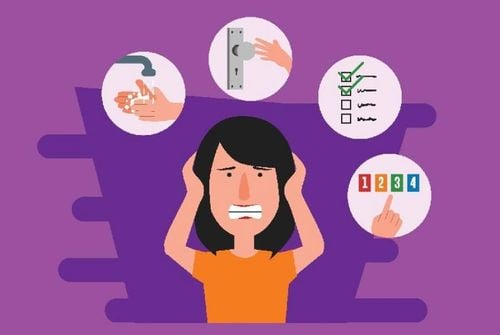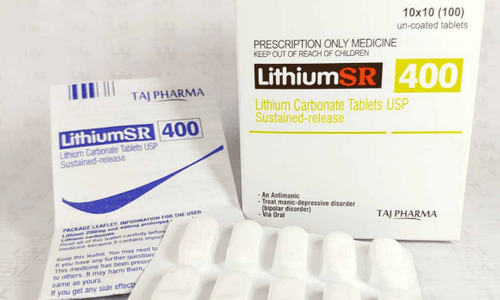This is an automatically translated article.
People with obsessive-compulsive disorder often have thoughts or things they force themselves to do that make them miserable but are difficult to ignore or get out of their minds. Over time, these thoughts accumulate, causing the patient to feel depressed and make decisions that are not sober.
1. What is Obsessive Compulsive Disorder?
One dangerous thing about obsessive-compulsive disorder (OCD) is that even though the person has stopped thinking about these obsessions, they keep coming back. The following are the groups of obsessive-compulsive disorders:
Cleaning – dirty:
Persistent worries about germs or illness Thinking about feeling dirty or unclean (physical or mental) Worries persistent fear of exposure to blood, toxic substances, viruses, or other sources of contamination Avoid possible sources of contamination Forced removal of items you consider dirty (even if they are not) ) Forced washing or cleaning of contaminated items Specific cleaning or washing rituals, such as washing hands or scrubbing surfaces a certain number of times. Symmetry and arrangement:
Requests for items or utensils to be aligned in a certain way High demands for symmetry or organization in categories Requires symmetry in actions (if you scratch left knee, you have to scratch your right knee too) Forced to organize your furniture or other items until they feel "just right" Feeling incomplete when items are incorrect Counting rituals , such as needing to count to a specific number a certain number of times Superstitious thinking or believing that something bad will happen if you don't arrange or organize things the right way Organizing rituals or specific arrangements of objects. Taboo thoughts:
Frequently having thoughts of a sexual or violent nature Feelings of guilt, shame, and other distress about your thoughts Constantly questioning sexual orientation, desires or your sexual preferences Persistent worry that you will act on your intrusive thoughts or that having them makes you a bad person Constantly worried that you will harm yourself or others without meaning Obsessed with religious ideas that feel blasphemous or wrong A nagging sense of responsibility for doing bad things Forced to hide things you could use as weapons Trying to make sure you won't act on intrusive thoughts Try to make sure you're not a bad person Mental rituals to dispel or cancel your thoughts Regularly review your daily activities to make sure you don't hurt anyone, whether mentally or physically. Hoarding:
Persistent worry that throwing something away could harm you or others The need to collect certain items to protect yourself or others from harm Extreme fear when accidentally discarding an important or essential item (such as a letter with sensitive or essential information) Forced purchases of multiple items of the same item, even if you don't need much of it Difficult to throw things away because touching them can cause contamination Feel inadequate if you can't find a possession or accidentally lose or throw it away Forced inspection or review of your property.

Một số hành vi hội chứng rối loạn ám ảnh cưỡng chế
2. Dangers of Obsessive Compulsive Disorder
Researchers analyzed more than 40 years of data from the Swedish National registries, to estimate the risk of suicide in people with obsessive-compulsive disorder and to determine what causes people are more or less likely to attempt suicide. By comparing the list of all people hospitalized in Sweden since 1969 with the list of all deaths in Sweden since 1952, the researchers tracked the number of people suffering from obsessive-compulsive disorder. OCD compulsions are likely to attempt suicide or die by suicide. They identified 36,788 people with obsessive-compulsive disorder in the Swedish National Patient Register between 1969 and 2013, of which 545 died by suicide and 4,297 attempted suicide. . The researchers found that the risk of dying from suicide was about 10 times higher in people with obsessive-compulsive disorder than in the general population, and the risk of a suicide attempt was five times higher.
They also found that:
Women with obsessive-compulsive disorder ocd were more likely to attempt suicide than men with obsessive-compulsive disorder, but the women did not have the disorder compulsions are less likely to attempt suicide than men without obsessive-compulsive disorder men with obsessive-compulsive disorder are more likely to die from suicide People with obsessive-compulsive disorder are more likely to have more than two suicide attempts Have a personality disorder or substance abuse disorder in addition to obsessive-compulsive disorder that increases the risk of suicide Having a type of anxiety disorder other than true obsessive-compulsive disorder a reduced risk of death from suicide, as well as higher socioeconomic status and higher education levels Obsessive-compulsive disorder has a similar risk of suicide as other mental illnesses such as schizophrenia paralysis and bipolar disorder and a higher risk of trauma- or alcohol-related disorders People with more education are more likely to commit suicide, but are less likely to die by suicide People who have attempted suicide before are more likely to die by suicide.
While people with obsessive-compulsive disorder and another mental illness were more likely to die by suicide, 43% of those with obsessive-compulsive disorder in the study died by suicide do not have any other mental illness. This suggests that people with obsessive-compulsive disorder alone have a higher risk of suicide.
The researchers concluded that it is important that people with obsessive-compulsive disorder be monitored for suicidal thoughts. This is especially true for people with other mental illnesses and a history of suicide attempts.
The researchers also report that public education, support from family and friends, and access to mental health care can reduce the stigma surrounding obsessive-compulsive disorder. This improves the likelihood of seeking help and reduces the risk of suicide.
3. Is Obsessive Compulsive Disorder Dangerous?
Obsessive-compulsive disorder is more than just an obsession. Obsessive-compulsive disorder is defined by repetitive thoughts and actions that cannot be controlled or can only be controlled for a short period of time.
Actions, called rituals, are performed out of habit due to some kind of trigger. Fear of germs and constantly washing hands is a clear example.

Người bị hội chứng rối loạn ám ảnh cưỡng chế ocd nên đến gặp bác sĩ để được thăm khám
Obsessions are intrusive thoughts that can include sexual images and desires, harm and moral correctness. These thoughts often persist despite the individual's efforts to confront them. Here are 5 ways obsessive-compulsive disorder can have deadly consequences:
Appearance complex Appearance complex is characterized by persistent thoughts that a person's body is perfect or ugly. These negative thoughts, like obsessive-compulsive disorder, can cause severe emotional distress and problems with daily functioning.
This disorder is also often characterized by some repetitive behaviors similar to obsessive-compulsive disorder, including compulsive scratching, excessive grooming, and excessive exercise.
Hoarding disorder Hoarding disorder is a condition that is also closely related to OCD. This is where an individual is unable or has persistent difficulty in disposing of property.
This disorder is characterized by anxiety related to possessiveness. Individuals may not want to get rid of their possessions, but they may also be embarrassed by them. As hoarding becomes increasingly severe, impairment of daily living can occur. These include loss of physical space, social problems and even danger to health due to unsafe sanitary conditions.
Relationship problems The coexistence of obsessive-compulsive disorder and social anxiety can also affect an individual's relationships, including dating and marriage.
The so-called "obsessive-compulsive relationship disorder" is characterized by persistent doubtful thoughts about one's partner. These may relate to levels of attraction and questions about how worthy it is to be with a certain individual. These types of nagging thoughts have the potential to harm a relationship, if left untreated.
Depression A person's perception of OCD and time being "stuck" in certain behaviors can affect quality of life, which in turn leads to depression.
Risk of suicide Suicidal thoughts are also more common in people living with obsessive-compulsive disorder. It can become so debilitating that people think that death may be their only salvation, the only way out of their suffering. Suicidal thoughts tend to increase with the severity of the illness. The more severe a patient's condition does not respond to treatment, the more likely they are to start thinking about suicide.
4. What should the patient do?
Many people experience minor obsessive or compulsive symptoms from time to time. But it may be time to get help for obsessive-compulsive disorder if:
Obsessive or compulsive thoughts occupy more than an hour of your day Intrusive thoughts or your efforts to stop them are causing pain suffering Obsessive-compulsive disorder symptoms upset you, frustrate you, or cause other trouble Obsessive-compulsive disorder symptoms interfere with the things you need or want to do Compulsive images negatively affect your life and relationships. In summary, people with obsessive-compulsive disorder often have thoughts or things that compel themselves to do, that cause them suffering but are difficult to ignore or get out of their mind. Over time, these thoughts accumulate, causing the patient to feel depressed and make decisions that are not sober. Therefore, if you suspect yourself or a loved one has signs of depression or obsessive-compulsive disorder, the patient should seek help and advice from a doctor to get treatment and avoid bad consequences. disease caused.
Psychological specialty - Vinmec International General Hospital has the function of examining, consulting and outpatient treatment of psychological problems and psychological health. With modern equipment, combined with the implementation of psychological tests, intensive psychotherapy for diagnosis and treatment, Vinmec will bring the best medical examination and treatment efficiency.
Please dial HOTLINE for more information or register for an appointment HERE. Download MyVinmec app to make appointments faster and to manage your bookings easily.
Reference source: Sane.org












